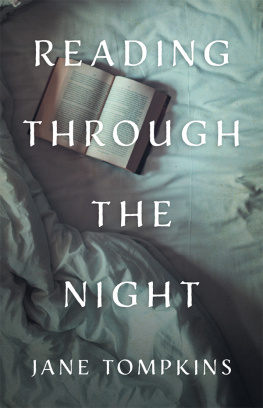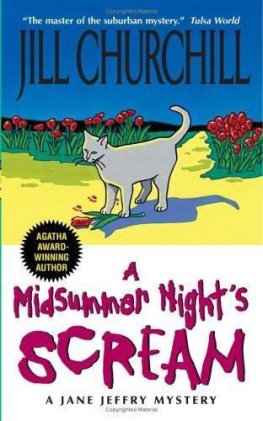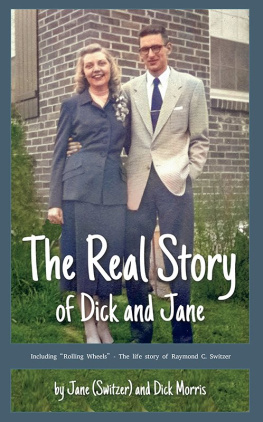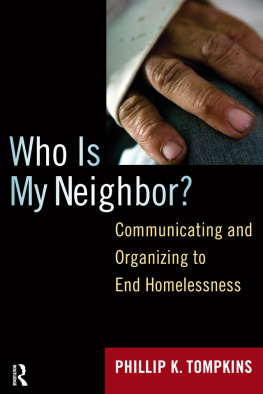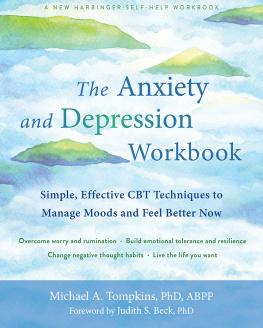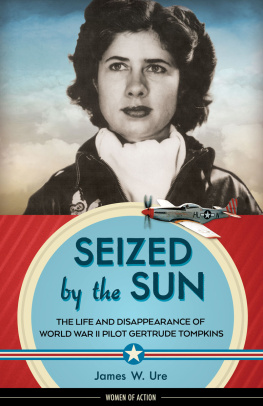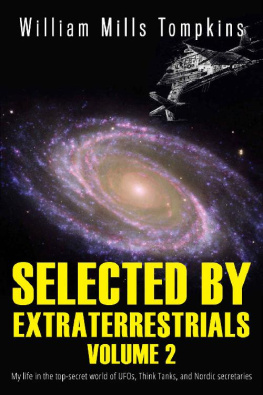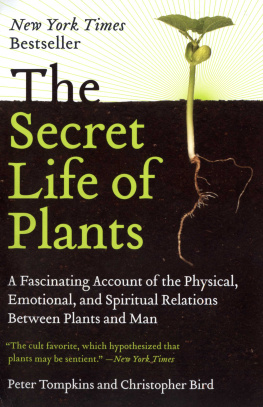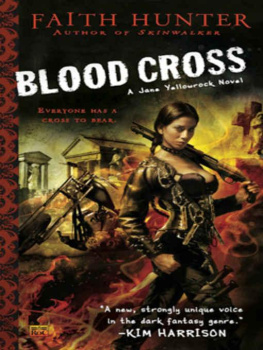Jane Tompkins - Reading Through the Night
Here you can read online Jane Tompkins - Reading Through the Night full text of the book (entire story) in english for free. Download pdf and epub, get meaning, cover and reviews about this ebook. year: 2018, publisher: University of Virginia Press, genre: Religion. Description of the work, (preface) as well as reviews are available. Best literature library LitArk.com created for fans of good reading and offers a wide selection of genres:
Romance novel
Science fiction
Adventure
Detective
Science
History
Home and family
Prose
Art
Politics
Computer
Non-fiction
Religion
Business
Children
Humor
Choose a favorite category and find really read worthwhile books. Enjoy immersion in the world of imagination, feel the emotions of the characters or learn something new for yourself, make an fascinating discovery.
- Book:Reading Through the Night
- Author:
- Publisher:University of Virginia Press
- Genre:
- Year:2018
- Rating:4 / 5
- Favourites:Add to favourites
- Your mark:
- 80
- 1
- 2
- 3
- 4
- 5
Reading Through the Night: summary, description and annotation
We offer to read an annotation, description, summary or preface (depends on what the author of the book "Reading Through the Night" wrote himself). If you haven't found the necessary information about the book — write in the comments, we will try to find it.
Reading Through the Night — read online for free the complete book (whole text) full work
Below is the text of the book, divided by pages. System saving the place of the last page read, allows you to conveniently read the book "Reading Through the Night" online for free, without having to search again every time where you left off. Put a bookmark, and you can go to the page where you finished reading at any time.
Font size:
Interval:
Bookmark:

University of Virginia Press
2018 by Jane Tompkins
All rights reserved
Printed in the United States of America on acid-free paper
First published 2018
ISBN 987-0-8139-4159-2 (cloth)
ISBN 987-0-8139-4160-8 (ebook)
9 8 7 6 5 4 3 2 1
Library of Congress Cataloging-in-Publication Data is available for this title.
Cover art: iStock/hsyncoban
To Sharon Anson
and
to the authors whose
books have kept me going
all these years
In reality, every reader is, while he is reading, the reader of his own self. The writers work is merely a kind of optical instrument which he offers to the reader to enable him to discern what, without this book, he would perhaps never have experienced in himself.
Marcel Proust, In Search of Lost Time
I wanted to describe the world because to live in an undescribed world was too lonely.
Nicole Krauss, The History of Love
PREFACE
I had been reading all my lifeas a child on summer vacations, as a student, and as a literature professorbut until I got sick and had to read for hours at a time to make the day go by, I never knew what reading could be. I read while I rested because it was all I could do. My life felt useless, my sense of self-worth was barely detectable. Then one day a stranger who subsequently became a friend gave me a book that captivated me. I couldnt get it out of my head; it was as if Id been kidnapped. Im an enthusiast where books are concerned, but this bookSir Vidias Shadow, Paul Therouxs account of his thirty-year friendship with V. S. Naipaulgripped me in a way few books had ever done. There was no reason for it, since Id had no interest in either author. I was retired, sick, and unable to work; I hadnt written anything in a long time, but I sat down at my computer and started writing, determined to find out what was going on.
The going was slow. I went down blind alleys and came up with answers that werent the real thing. I read a lot of Naipaul, I read more Theroux, I went back to Sir Vidias Shadow, probing deeper. One day, I reread a chapter where the two men have lunch in a London restaurant; it was exquisitely painful. Naipaul insults and exploits Theroux, subtly, then blatantly. Something about the way I felt when I read this scene seemed awfully familiar. Finally, it came to me. These feelings mirrored the way I felt when my husband spoke to me in a certain way, and that wasnt all. They also reflected how my mother had sometimes made me feel: ashamed, hurt, angry, and impotent. The revelation cast light in two directions. It let me see clearly for the first time a behavior pattern that had controlled my reactions to people my entire life, and it showed me that the spell Sir Vidias Shadow had put me under came less from the book itself than from my own experience. That realization opened the door to a new way of reading.
Now, as I read Naipaul and Theroux, incidents from my own life began to appear; pieces of my past offered themselves unbidden. Instead of trying to analyze what the authors had written, I started to analyze the material their writing had unearthed. I began to make connections between parts of my life Id not made before, stumbled on patterns Id never noticed. It occurred to me that if the works of Naipaul and Theroux could have this effect, surely other books could, too. Branching out, I read what was around the houseliterary criticism, journalism, contemporary novels, detective fictionand sure enough, while the feelings these books evoked were different, the structure of the experience was the same. Just as before, by observing my reactions to what I read, I saw things about myself I didnt want to seeenvy, a desire for fame, assumptions of moral superiority that were completely unfounded. Under the pressure of remembered incidents from my past, criticisms Id started to formulate about the authors I was reading turned to dust.
From time to time, I paused to speculate on the ways reading had impacted my lifeId started out using it as a refuge and as a vicarious form of adventure, then it metamorphosed into professional capital and a source of creativity. And now it had become a path of self-discovery. Not an easy path, but a transformative one. I went from book to book, and from memory to memory, and thus did the night of my illness yield up its treasure, bringing me face to face with who I was.
Introduction
Living through Books
Not long ago, I couldnt sleep because of a book I was reading before I went to bed. It was a travel memoir by Alden Jones called The Blind Masseuse. It took me back to my junior year abroad in Italy. I was nineteen and wanted to get away and meet the world on my own. Joness book brought back the taste of a peach I ate just after docking at Naples. Our group was seated in a noisy, open-air restaurant, I was sleep deprived (Id stayed up all night talking to an enchanting man) and anxious about everything: being in a foreign country for the first time, being with people I didnt know (there was a joke going around the table that I wasnt in on)but the peachthe peach was fat, round, beautiful, juicy, and delicious. When I bit into it the juice ran down my chin. The taste enveloped me; it let me know there was a new world here for the tasting. All I had to do was open my mouth.
The Blind Masseuse reintroduced me to the pleasures of travel as adventure, and in so doing gave me a shot of energy that took days to wear off. For many years Id had a little-understood illness called myalgic encephalomyelitis (ME, for short), known until recently as chronic fatigue syndrome. Since fatigue, sore throats, and a low energy level had limited my ability to move around the world at will, the chance to visit exotic locales with a person whom I felt comfortable with gave me something I needed: new experiences and a lessening of loneliness. Alden Jones went to places Id never been, and I liked her style.
Her story starts in New York, where she worked at a publishing company after graduating from college. But the thought of becoming like her boss and staring at the same view every day, year after year, stuck in her craw. So when he objected to her going out for morning coffee one day, she quit and booked a ticket for Cochabamba, Bolivia. She was my kind of girl. Jones ends up traveling around the world: Costa Rica, Nicaragua, Cuba, Cambodia, Burma, Italy, and Egypt. She leads student groups on educational trips, teaches English in Latin America, and travels on her own. If you exclude stomach trouble, nothing gut-wrenching or dramatic happens to her in any of these places, yet I read quickly and eagerly. Jones had a knack for putting me right there with her, feeling the sting and fizz of a cold Coca-Cola on a hot day, or the pangs of a bad stomachache. I needed this kind of thing: it was vicarious, but it was real. And I liked the way she reflected on what she saw.
On her first day in Bolivia, shes pelted with gravel and mango pits by three women protest marchers who laughed at her when she shouted Why? Later, she learned that these were Bolivian farmers demonstrating against their own government for co operating with the U.S. Drug Enforcement Administration, whose policies had taken away their livelihoodgrowing coca. Jones had been standing in front of the one store in town that hadnt closed in solidarity with the march.
Jones knew nothing about any of this because she was in the habit of waiting to read about the countries she visited until after returning home. As she puts it, I preferred to go in more or less blind, become curious about things as I observed them. Her ignorance means she has no preconceived ideas about what her experience will be like, but also no knowledge that might have kept her out of situations where people threw stones at her. In any case, the incident forces her to see that shes not the person she wishes she werean activist who has come to Bolivia to fight injusticebut a cerebral American, torn between a life of prestigious office jobs and the life of a vagabond who wanders into foreign lands with her eyes wide open. I devoured the book.
Next pageFont size:
Interval:
Bookmark:
Similar books «Reading Through the Night»
Look at similar books to Reading Through the Night. We have selected literature similar in name and meaning in the hope of providing readers with more options to find new, interesting, not yet read works.
Discussion, reviews of the book Reading Through the Night and just readers' own opinions. Leave your comments, write what you think about the work, its meaning or the main characters. Specify what exactly you liked and what you didn't like, and why you think so.

